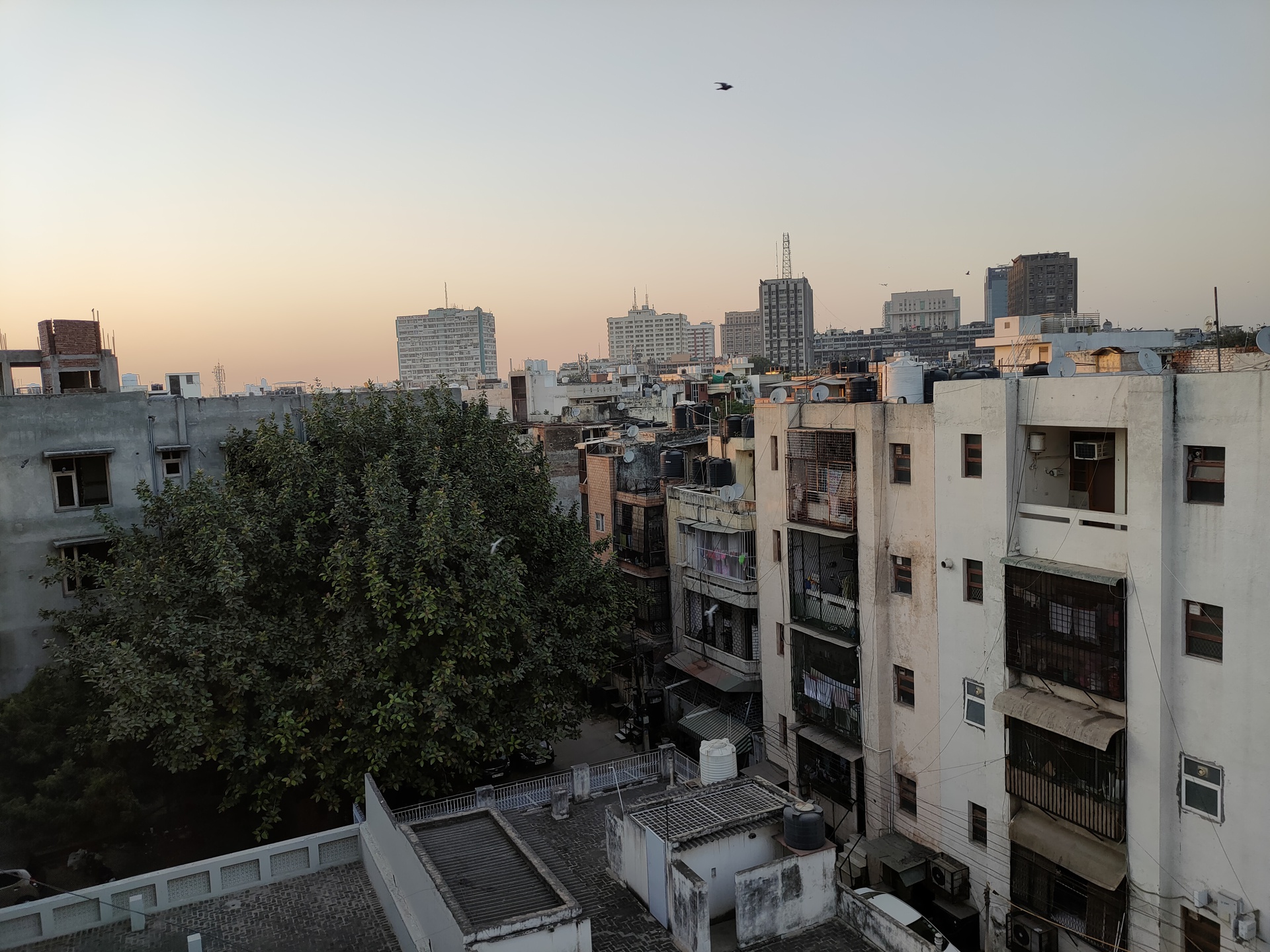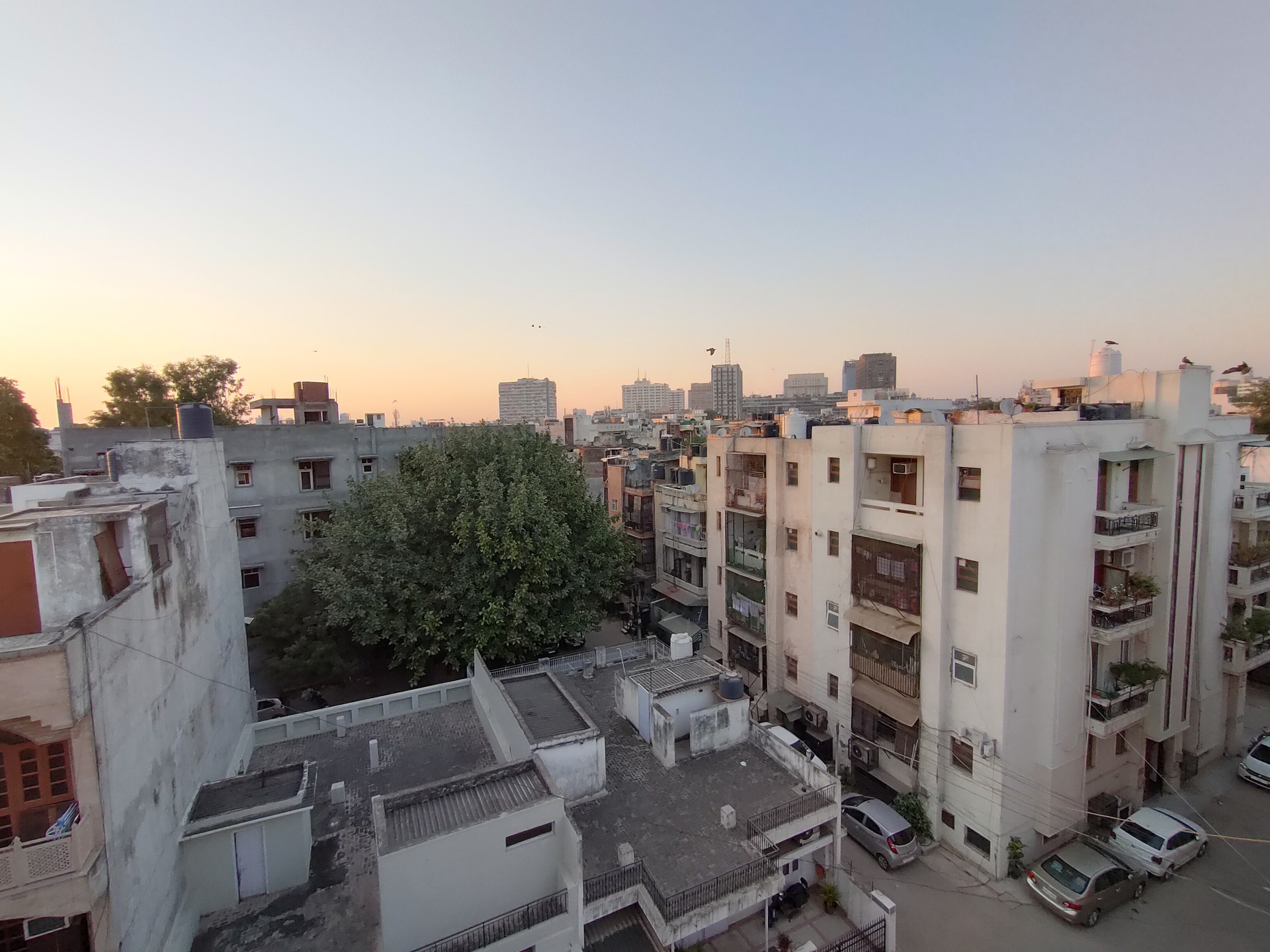Realme’s rapid cycle of iteration means that you can expect a new mid-range flagship every few months. Unfortunately, Realme’s definition of rapid iteration involves adding a few features, while taking away others. This time around, the Realme 7 Pro adds faster 65W charging but switches up the camera set up.
How well does the Realme 7 Pro fare as a successor to the Realme 6 Pro, and more importantly, is this the phone to get in the ultra-competitive mid-range segment? Let’s find out in the Android Authority review of the Realme 7 Pro.
Design
- 160.9 x 74.3 x 8.7mm
- Polycarbonate construction
- 182 grams
- Super AMOLED display
- Gorilla Glass 3

The Realme 7 Pro, like the Realme 7, is a small step forward from the Realme 6 series — and that’s not a bad thing. The phone trades bling for simple sophistication and does a reasonably good job at it.
Starting off with the back, the Realme 7 Pro has a lot in common with the visual identity of the Realme 7. The split tone finish on the plastic back looks great and feels pretty sturdy too. The matte finish doesn’t attract too many fingerprints, but scuffs can be a bit hard to clean.


Good ergonomics are table stakes, and the Realme 7 Pro does well here. Over on the right, the power button is particularly clicky, while the split volume rocker on the left feels pretty good as well. I did, however, notice just a bit of wobble in the volume keys. Finally, along the bottom edge lies the USB-C port, as well as the headphone jack.
Construction is generally good, but there's a hint of wobble in the volume buttons.
The front of the Realme 7 Pro has seen significant changes compared to the outgoing Realme 6 Pro. To start with, the Full HD+ panel has now been switched out from an 6.6-inch IPS LCD display to a 6.4-inch Super AMOLED panel.

The panel looks excellent, though the default color tuning is set a bit too cool for my preference. As is usually the case, switching color profiles is a cinch and the Realme 7 Pro’s display exhibits excellent color reproduction with deep blacks and punchy colors. I found brightness levels to be more than adequate for outdoor use.
Realme has made some interesting compromises with the display on the Realme 7 Pro, however. For one, the switch from an IPS to AMOLED panel brings with it the loss of a high refresh rate option. I don’t personally mind it too much, but a 90Hz panel definitely adds to the experience, and this should factor in your purchasing decision. In addition, the phone switches out Gorilla Glass 5 for Gorilla Glass 3.

Finally, the camera cut-out at the top is much smaller this time around, but for an unfortunate reason. You see, Realme has dropped the rather good dual camera front-facing module and, instead, has settled for a single 32MP front-facing camera.
The Realme 7 Pro presents itself as a well put together piece of kit. I found the under-display fingerprint scanner to be particularly capable. Of course, there’s no IPS rating here. Overall though, the phone takes some good steps forward. The reduced weight and overall dimensions go a long way in improving daily usability. The polycarbonate build isn’t as luxurious as some of the other options in this category but it does the trick and feels well built to boot.
Performance
- Snapdragon 720G
- Adreno 618
- 6/8GB RAM
- 64/128GB storage

Realme’s mantra of not fixing what isn’t broken rings true with the Realme 7 Pro as well. The phone continues to use the exact same Snapdragon 720G chipset as the Realme 6 Pro. The 8nm octa-core chipset is paired up with an Adreno 618 GPU that keeps the phone running smooth.
Performance more or less remains unchanged here. The Snapdragon 720G handily keeps up with day-to-day use without breaking a sweat. Gaming is satisfactory as well, and the step down from a 90Hz panel to a 60Hz refresh rate should further assist with eking out a few more frames from demanding games.
The nearest competitor for the Realme 7 Pro remains the Poco X3. The Snapdragon 730G toting smartphone is a bit more powerful, but the 120Hz refresh rate negates the advantages of the GPU. The actual difference in performance is smaller than you’d anticipate.
Battery
- 4,500mAh
- 65W charging
The biggest step forward with the Realme 7 Pro comes on the battery front, and more importantly with charging speeds. The 4,500mAh cell is a step up from the 4,300mAh battery on the Realme 6 Pro and that phone already delivered excellent battery life. My daily use involves juggling a whole lot of emails, calls, and social media use, and the phone consistently delivered a day and a half of usage.
65W charging is incredible, and the ability to charge your phone in under 40 minutes is a serious value add.
Your mileage will vary, however. Extended gaming will definitely put a dent in battery life, but a full day of use should be easy enough.
Charging speeds get a major upgrade to 65W and that’s the real upsell here. The phone tops off just short of 90% in half an hour, with a full charge taking under forty minutes.
Software
- Realme UI
- Android 10
On the software front, things haven’t changed much — for better or worse. The Realme 7 Pro runs Realme UI on top of Android 10 and the experience is a bit of a mixed bag.



The onboard bloatware isn’t ideal, but the forceful browser notifications are particularly irksome. The phone ships with over 20 pre-installed apps, including Realme’s take on a music player that once again has ads in the interface. The entire experience is less than ideal despite the fact that most of the apps can be uninstalled.
On the flipside, Realme has done a stellar job at optimization. The interface is extremely fluid. Swiping and scrolling are a joy. I did not notice a single stutter or lag.
Camera
- 64MP main, f/1.8, 1/1.73-in. sensor
- 8MP ultra-wide, f2.3
- 2MP, f/2.4 depth sensor
- 2MP, f/2.4 macro sensor
- Video: 4K @30fps, 1080p @120fps, 720p @960fps
- Selfie: 32MP, f/2.5
- Selfie video: 1080p @30fps
With the Realme 7 Pro, the company has once again re-jigged the camera system. In fact, compared to the Realme 6 Pro, the 7 Pro eschews a telephoto lens altogether. Additionally, the secondary ultra-wide camera at the front is no longer included either.
Instead, the Realme 7 Pro makes do with a 64MP primary shooter paired up with an 8MP ultrawide camera, a 2MP macro lens, as well as a 2MP depth sensor. Meanwhile, at the front lies a 32MP shooter.

Photographs from the primary shooter are very good, with an excellent amount of detail and true-to-life colors. While there is a hint of oversharpening, Realme hasn’t gone overboard here. Compared to the Realme 7, the company has done a much better job at balancing the color science.
Meanwhile, noise reduction is minimal and I did not observe any untoward smearing on close inspection.
 Realme 7 Pro ultrawide Realme 7 Pro primary camera
Realme 7 Pro ultrawide Realme 7 Pro primary camera

The camera tuning between different modes comes close but isn’t exactly the same. Unfortunately, the limits of the 8MP ultra-wide camera resolution are evident here. There’s not much room for cropping in without a noticeable drop in image quality.

Lacking a telephoto lens altogether, zoom functionality is entirely digital in nature. The 64MP resolution helps, but there are some key takeaways. Images produced largely have a similar color profile, but Realme has upped sharpening a bit too much.
Daylight shots look decent enough, but there is a definite loss of detail once the light starts dropping. Images look just fine on the phone’s display but pixel-peeping reveals aggressive noise reduction and sharpening.

The macro camera caught me by surprise. While I don’t particularly care about macro photography, the 2MP camera did a reasonable job of capturing close ups.
Elsewhere, the 32MP selfie camera captures richly detailed images that do a particularly good job at capturing skin tones — once you turn off the selfie enhancement features.
You can take a closer look at full resolution Realme 7 Pro image samples here.
Audio
- 3.5mm audio jack
- AAC, AptX, Apt HD, LDAC support
Yes, the Realme 7 Pro includes a headphone jack! Audio sounds plenty good even when paired up with high-end headphones. The phone includes stereo speakers, but the audio output isn’t quite stellar. Peak volumes aren’t particularly loud and there’s very little depth to the tinny output.
Meanwhile, Bluetooth audio is just as good as anything else in the segment. There is support for AAC, AptX HD, and LDAC which ensures that no matter your headset, you’ll be able to pipe out high-quality music.
Specifications
| Realme 7 Pro | |
|---|---|
| Display | 6.4-inch, FHD+ Super AMOLED 2,400 x 1,080 resolution 60Hz |
| Chipset | Qualcomm Snapdragon 720G 2x Kyro 465 Gold 6x Kyro 465 Silver |
| GPU | Adreno 618 |
| RAM | 6/8GB |
| Storage | 128GB |
| MicroSD | Yes |
| Battery | 4,500mAh USB-C 65W charging |
| Camera | Rear: 64MP f/1.8 8MP f/2.3 ultra-wide 2MP f/2.4 macro 2MP f/2.4 monochrome portrait Video: 4K at 30fps, 1080p at 120fps Front: 32MP f/2.5, 85 degree FoV |
| IP Rating | N/A, splash-proof |
| Headphone port | Yes |
| Connectivity | Dual nano-SIM slots WiFi 802.11 a/b/g/n/ac 2.4/5GHz Bluetooth 5 |
| Security | In-display fingerprint sensor |
| Software | Android 10 Realme UI |
| Colors | Mirror White Mirror Blue |
| Dimensions | 160.9 x 74.3 x 8.7mm |
| Weight | 182g |
Value for money
Starting at Rs. 19,990, the Realme 7 Pro offers a lot of value for users who crave the fastest charging solution. Elsewhere too, the phone is well-built. Bloatware aside, it also has a highly optimized software build that flies.
If peak charging speeds aren’t the biggest priority for you, the company’s own Realme 6 Pro is a fantastic alternative. Priced starting Rs. 18,999, the phone offers a more versatile camera selection, the same power, and a 90Hz IPS LCD display. Of course, 30W charging is no joke either.
The real competitor, however, is the Poco X3. The phone is powered by a Snapdragon 732G, includes a massive 6,000mAh battery and a 120Hz refresh rate. Sure, it might not support 65W charging but with a battery that big, you shouldn’t need to charge the phone all that often anyway. Available starting at Rs. 16,999, the Poco X3 is definitely one to consider.
Verdict

The Realme 7 Pro is a small step forward with some key improvements. Image quality is solid, and performance is adequate though not quite best-in-class. Additionally, 65W charging support is excellent to have if you often find yourself scrambling to find the charger. However, the switched up camera setup comes across as a downgrade, and while some might appreciate the AMOLED display, the lack of a high-refresh rate option is sorely missed.
However, it isn’t quite the best option in the market. The Poco X3 offers a small performance boost, much of the same feature set, a higher refresh rate display and, at least in India, no ads.
The Realme 7 Pro is a classic example of the company taking a step forward, and two steps backward. While there’s nothing wrong with the hardware, the updated camera setup isn’t much of an upgrade at all.
Overall, the Realme 7 Pro is one of the better smartphone options under Rs. 20,000 in India, but there is better value to be had.
from Android Authority https://ift.tt/3dfwi5r

No comments:
Post a Comment